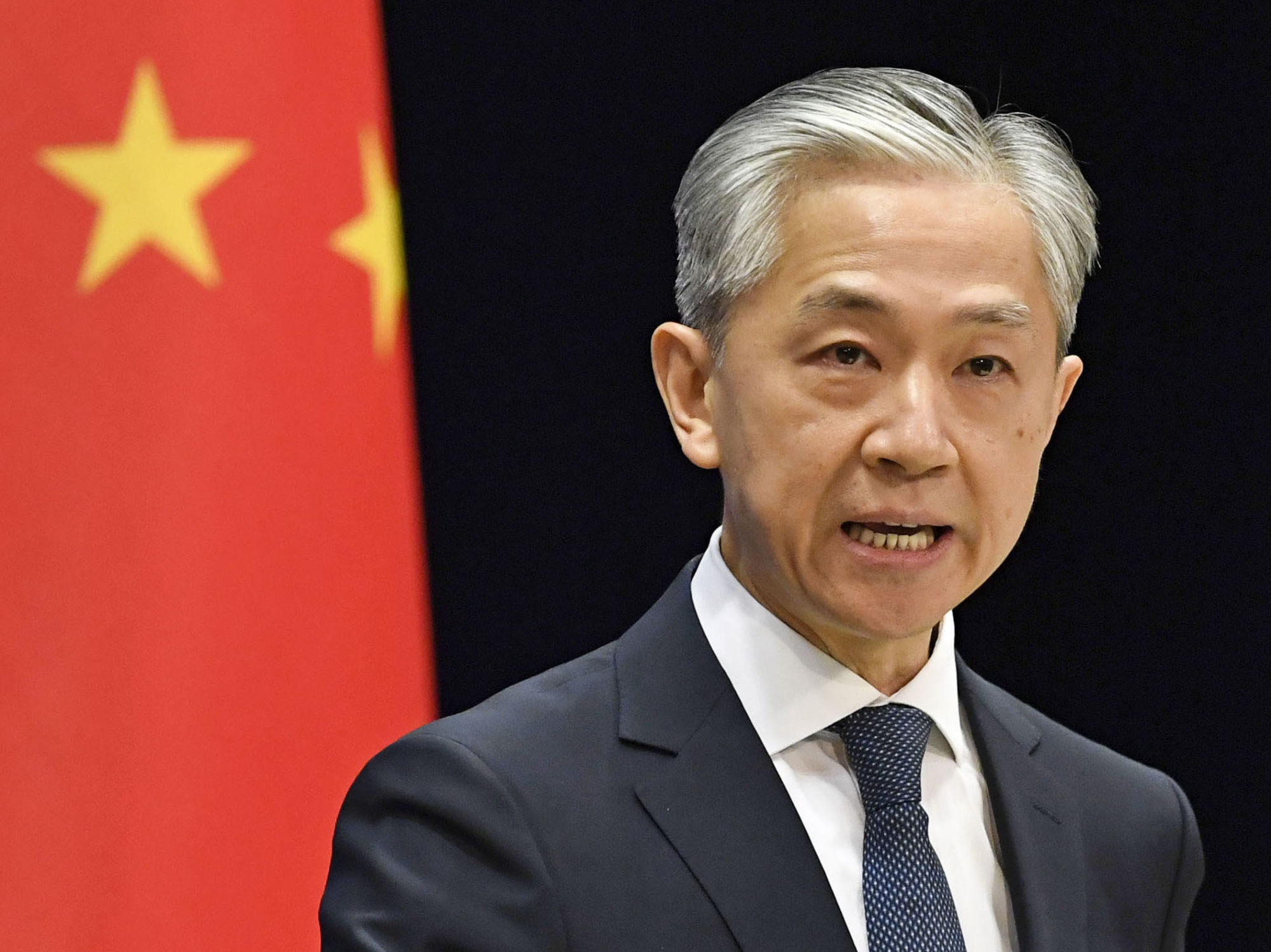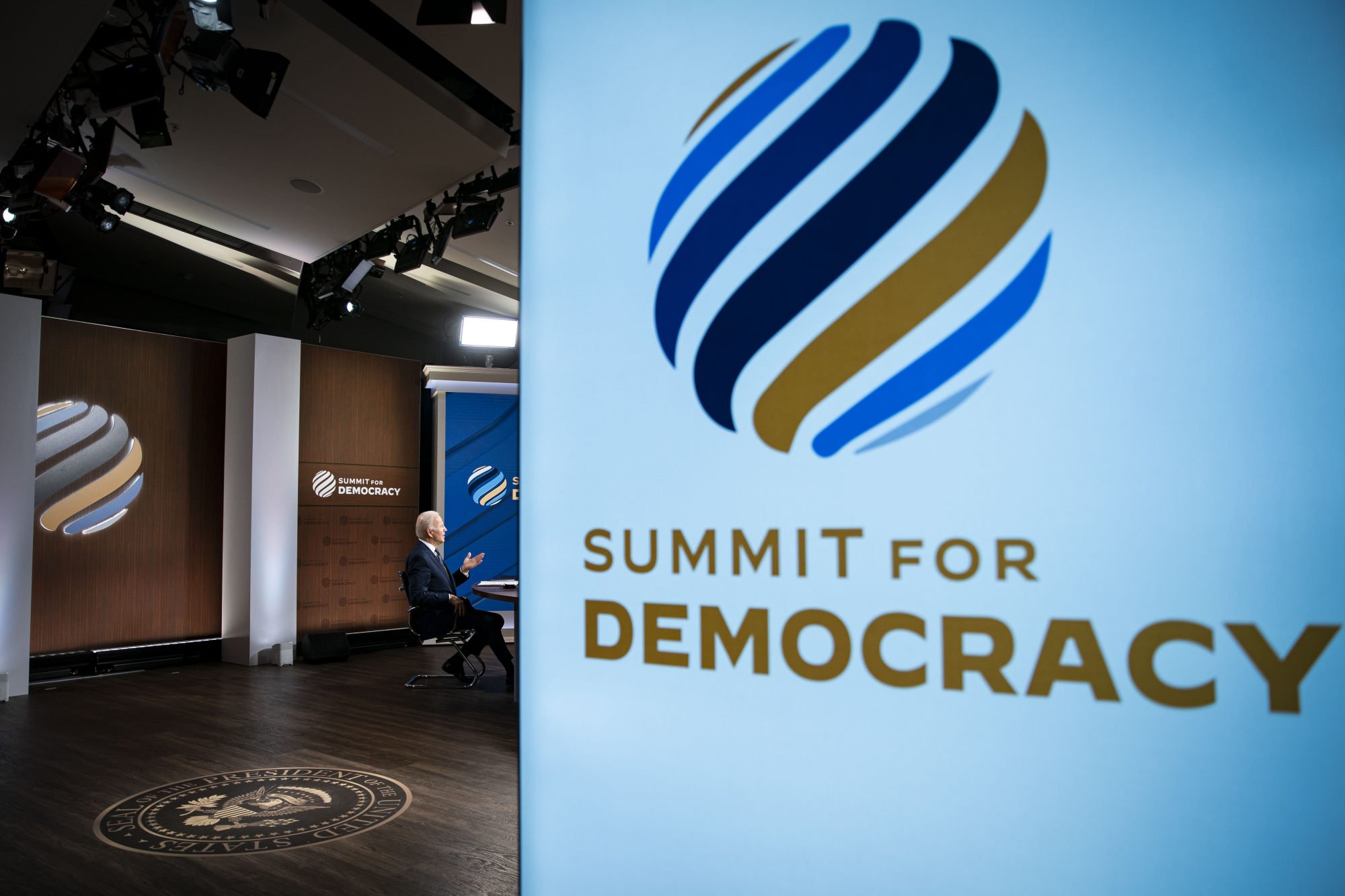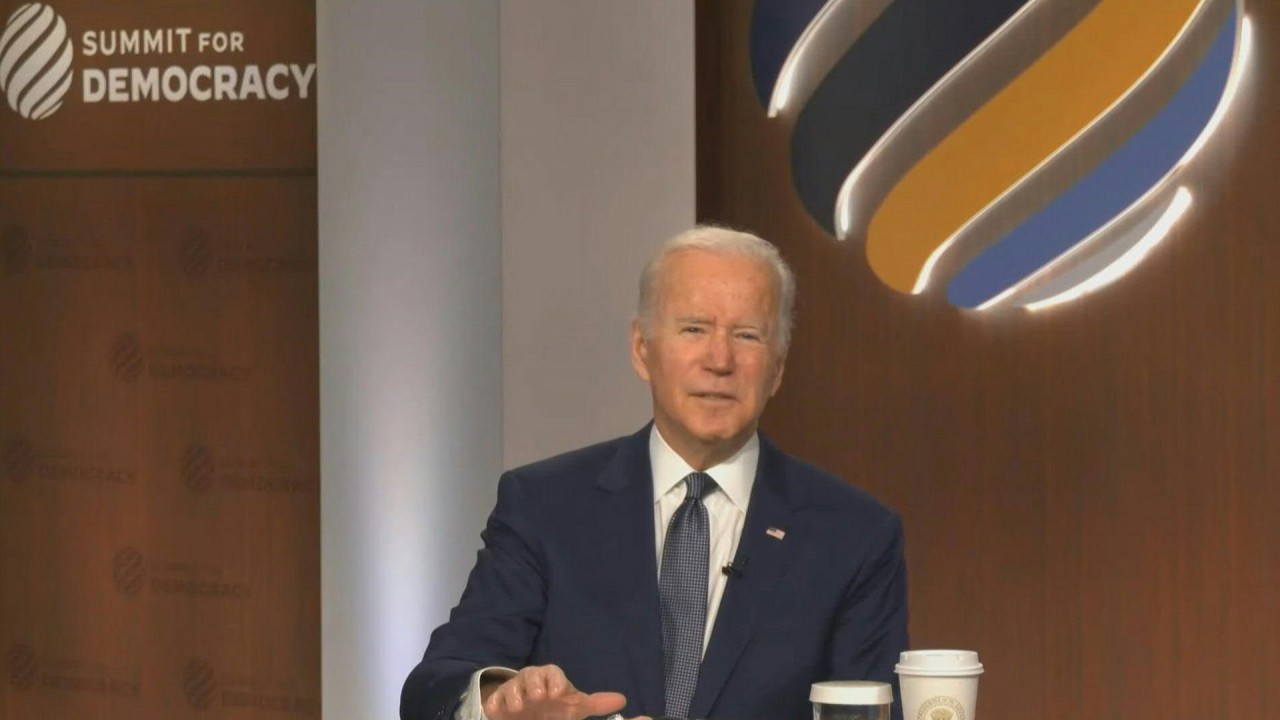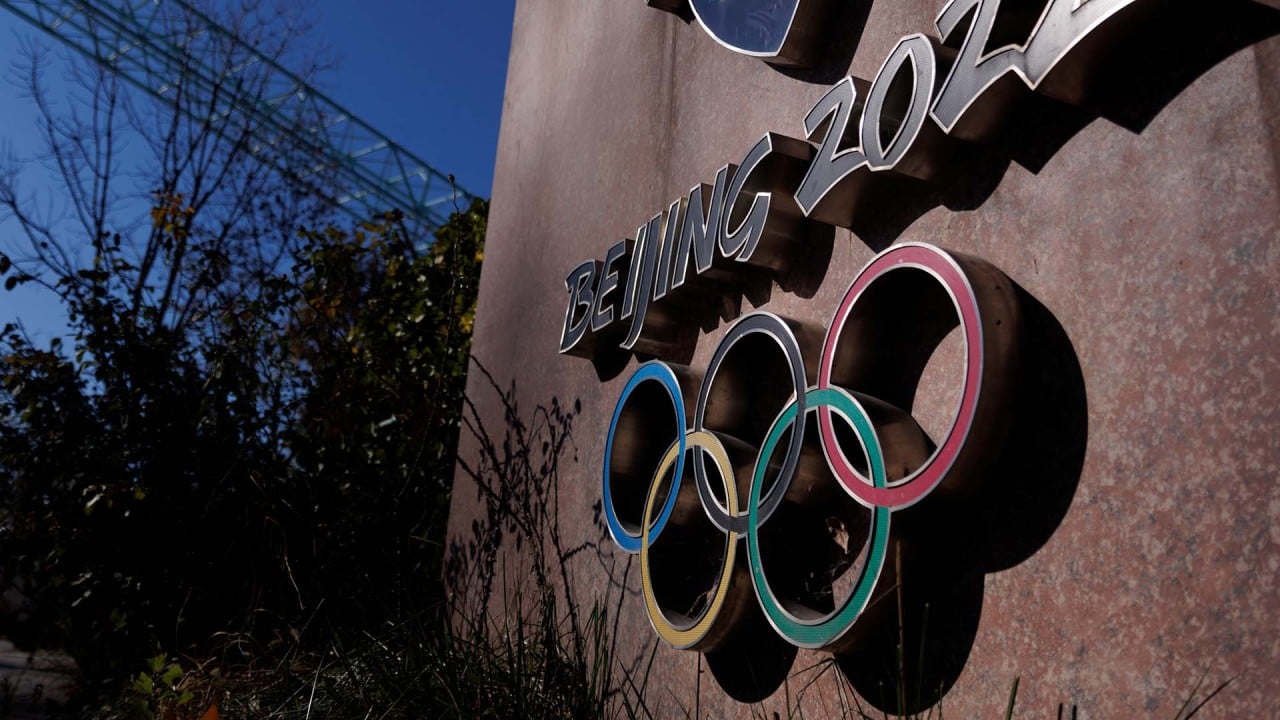
US opens Summit for Democracy, with Joe Biden calling for moves to counter authoritarianism as America eyes China
- ‘This is an urgent matter on all our parts,’ US president tells virtual gathering of more than 100 nations
- Event follows Biden’s efforts to strengthen ties with US allies in response to China’s growing global profile
The United States launched a two-day Summit for Democracy on Thursday with calls for introspection, restructuring and renewal as democracies around the world face unprecedented challenges.
“Democracy doesn’t happen by accident. We have to renew it with each generation,” Biden told the virtual gathering. “And this is an urgent matter on all our parts.”
Authoritarian governments argue that their top-down systems are faster at making decisions and better at preventing social division – even as China expands its economic, military and diplomatic clout and Russia amasses troops on its border with Ukraine.
Speaking in front of a screen filled with a checkerboard of tiny boxes filled with global leaders, Biden rejected those arguments.
“They seek to advance their own power, export and expand their influence around the world and justify their repressive policies and practices as a more efficient way to address today’s challenges,” he said of such governments.
“That’s how it’s sold, by voices that seek to fan the flames of social division and political polarisation.”

The high-profile event – which dovetails with Biden’s bid to strengthen ties among US allies to counter China’s growing might – comes as tensions continue to rise precipitously between Washington and Beijing.
The summit adds ideology and governance systems to the long list of bilateral differences, ranging from technology, trade and sanctions, to military posturing, nuclear weapons and the origin of Covid-19.
China and Russia, pointedly not invited to the summit, have assailed the gathering as divisive and a legacy of a Cold War mentality. China has argued that it is also a democracy, albeit of a different sort.
“No matter how the United States glosses over itself, its true face of seeking hegemony under the guise of democracy has long been exposed to the world,” Chinese Foreign Ministry spokesman Wang Wenbin said on Thursday in Beijing.
“The so-called ‘Summit for Democracy’ will only go down in history as a manipulator and saboteur of democracy.”
Biden called on the invitees to take concrete steps in the coming “year of action” to counter authoritarianism, fight corruption and protect human rights, the meeting’s three main themes.

In one of several measures apparently aimed at Chinese government practices, Biden announced a “multilateral surge and sustain fund for anticensorship technology” that would help connect more users to an uncensored internet.
He also called for greater control over surveillance and other technologies that strong-arm states use to suppress their citizens.
The fund Biden announced to support the summit’s objectives, which the White House said would be US$424 million, must still be submitted to and approved by the US Congress.
The summit guest list has faced criticism for including many governments with questionable or eroding democratic credentials, including India, Pakistan, the Democratic Republic of the Congo and the Philippines. The inclusion of Taiwan has also rankled Beijing, which considers the self-governing island a part of its territory.
A Carnegie Endowment for International Peace analysis found that more than 30 per cent of the invitees are from countries considered either not free or are only partly free.
The large number of invitees, reportedly the subject of debate within the administration, has also been criticised as unwieldy and likely to diffuse the message. Even granting each leader three minutes of speaking time would take more than five hours.
Organisers sidestepped this by giving a few leaders the podium and assigning others to thematic panels.
The summit includes breakout sessions for leaders, lawmakers, corporate executives and members of civic society on such issues as media freedom, private enterprise, technology and women and LGTBQ rights.
In a bid to counter suggestions that it is little more than a talking shop and to show pledge-drive leadership by example, the administration said its US$424 million global initiative would include: $US47 million to support independent media; $US76 million for anti-corruption programmes; $US63 million on marginalized and civic reform groups; $US122 million on worker protections; $US28 million for technology initiatives; and $US85 million for education, healthcare, democratic and fair election activists.

Biden conceded on Thursday that the United States has more than its share of problems and that democracies are hardly perfect. A report last year by civic group Freedom House, which noted that global freedom has been in retreat for 15 consecutive years, ranked the US on a par with Panama.
Beijing quickly ridiculed Washington’s conciliatory approach. “The US puts half of the world’s countries into a category of so-called ‘non-democracies’ with its own yardstick,” said Wang this week. “Is this called ‘humility’?”
China also disputes the idea that its Chinese Communist Party-led system has trouble admitting blunders in its own apparent effort at a conciliatory stance.
“The CPC has also experienced some missteps and setbacks in revolution, development and reform,” said Liu Pengyu, a spokesman at the Chinese embassy in Washington.
“The CPC has never been shy about its problems or covered up these mistakes. Instead, it has faced up to the problems, found out the causes and drawn wisdom and strength from them to move forward.”
Analysts said that the summit appears to have gotten under Beijing’s – and Moscow’s – skin in part over fears they could be isolated diplomatically and their legitimacy questioned at home.
“Democracies, which are not considered perfect – and that probably includes the United States – aspire to be better,” said Kurt Tong, a former US consul general to Hong Kong and Macau who is now a partner with the Asia Group.
“I think that’s a message that China has had some difficulty reacting to in a way that doesn’t sound defensive and shrill.”
The administration’s broader strategy of aligning with allies to counter Beijing has faced its share of speed bumps – including differing views on the balance between confrontation and cooperation – but appears to be gaining traction.
Washington has breathed new life into the Quad alliance of Japan, India, the US and Australia. In September, it unveiled an Australia-United Kingdom-US (Aukus) military alliance.
And this week the Biden administration announced a diplomatic boycott of the Beijing 2022 Winter Olympics that saw Australia, New Zealand, Britain and Canada quickly lend their support.
“US politicians keep hyping a ‘diplomatic boycott’ without even being invited to the Games,” countered Chinese spokesperson Zhao Lijian, continuing the tit-for-tat.
A common mantra in Washington is that China and Russia may have partners of convenience but few genuine friends, a view disputed in Beijing and Moscow.
“China maintains zero alliances, and its partnerships are mostly with pariah states,” said a Rand Corporation report last year.
“Compared to the United States, China’s friends are certainly not as numerous, nor are they as reliable. That is a major challenge for Beijing as great-power competition continues to ramp up.”
Concluding his remarks on Thursday, the US president said that democracy might be flawed, but that it could repair itself.
“This is the defining challenge of our time,” Biden said. “Democracy – government of the people, by the people, for the people – can at times be fragile. It is also inherently resilient, is capable of self-correction and is capable of self-improvement.”
Additional reporting by Robert Delaney



